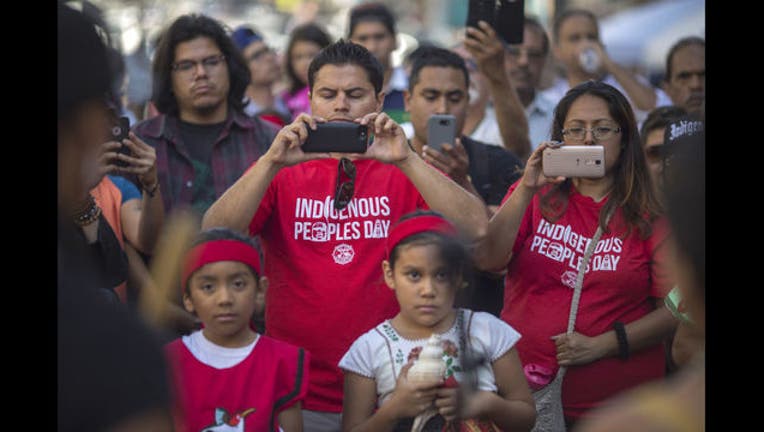Indigenous Peoples Day in Minneapolis, St. Paul, Grand Rapids

People watch a local Tongva tribal elder speak on Hollywood Boulevard near the El Capitan Theatre in Los Angeles, California. (Photo by David McNew/Getty Images)
MINNEAPOLIS (KMSP) - Minneapolis, St. Paul and Grand Rapids, Minnesota are a few of the U.S. cities that celebrate Indigenous Peoples Day on Oct. 9 instead of Columbus Day.
Leaders in those cities changed the holiday a few years ago. Residents asked for the name change because they felt it was not accurate to honor a man for “discovering” a place where people were already living. A number of other large cities, including Los Angeles, Seattle and Denver, are also moving to rename the holiday.
In 2014, the Minneapolis City Council unanimously approved a resolution to recognize the second Monday in October as Indigenous Peoples Day. The Minneapolis resolution states, “The City of Minneapolis recognizes the annexation of Dakota homelands for the building of our city, and knows Indigenous nations have lived upon this land since time immemorial and values the progress our society has accomplished through American Indian technology, thought, and culture.”
It continues to resolve that, “The City of Minneapolis shall continue its efforts to promote the well-being and growth of the Minneapolis American Indian and Indigenous community. … Indigenous Peoples Day shall be used to reflect upon the ongoing struggles of Indigenous people on this land, and to celebrate the thriving culture and value that Dakota, Ojibwe, and other Indigenous nations add to our city.”
Grand Rapids also passed an Indigenous Peoples Day resolution in 2014. Past celebrations have focused on dance, music and language, but this year’s celebration will focus on largely unexamined local history.
The city of St. Paul unanimously passed its resolution in 2015. The resolution affirms “the city’s commitment to promote the well-being and growth of St. Paul’s American Indian and Indigenous community.”
The concept of Indigenous Peoples Day was first proposed in 1977 by a delegation of Native nations at a United Nations-sponsored conference.

